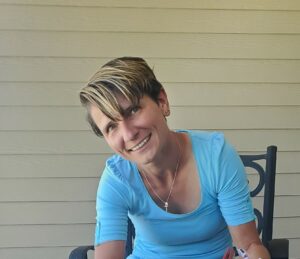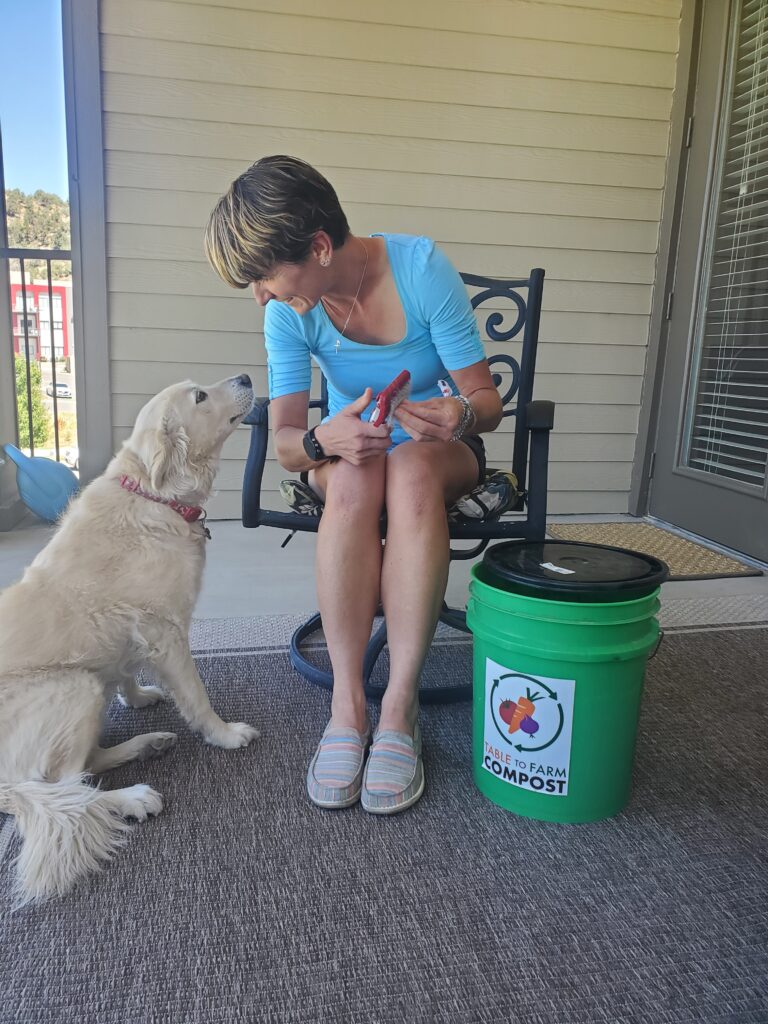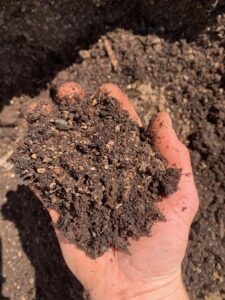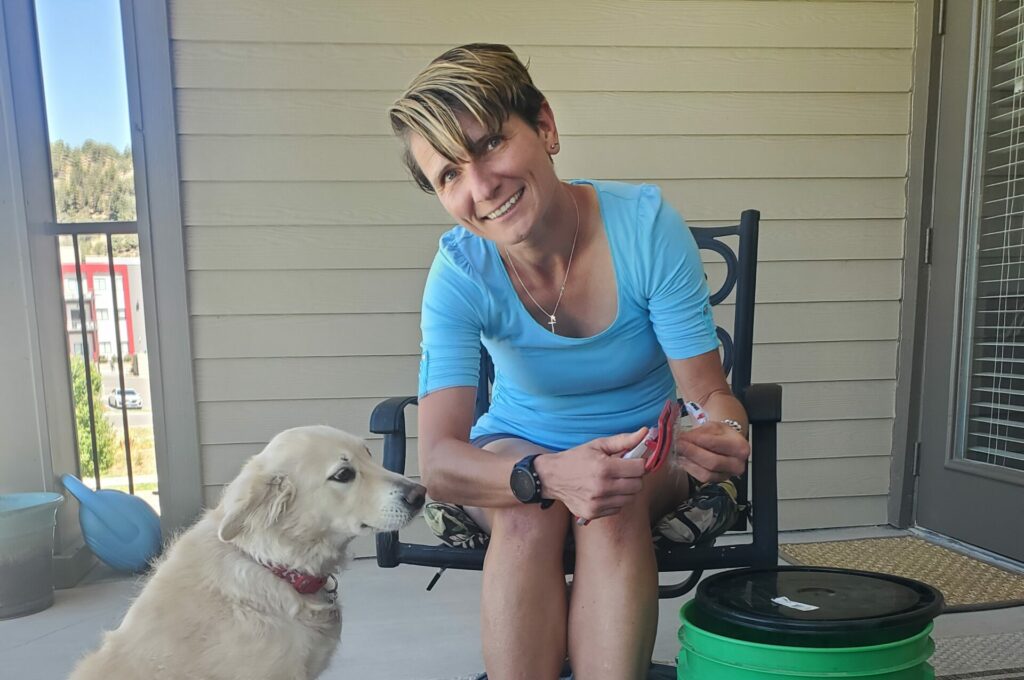One Woman Goes All In to Save the Planet
The Hand-Off
Zuzana Birova parted the curtains and scanned the neighborhood. The early morning light was faint as powder. She clutched the contraband hanging off her hand. In every way, it was like an Easter Egg with its smooth, vibrant green shell, precious cargo stashed inside. It needed to be hidden. Or, to be secreted away without any onlookers noticing.
Zuzana peeked again through the curtains. Still no signs of the courier. She’d have to wait. Bungling this hand-off would risk everything she had worked for so far in a bid to save the planet from devastating climate change.
Just then, headlight beams swiped across the street. The truck she’d been waiting for pulled up to her home. Zuzana lugged the Egg outside. She passed the green bucket to Jeremy, the friendly Table to Farm route driver. With a quick tip, he dumped the bucket’s contents into the trailer towed behind the truck. Zuzana’s household food scraps, pet hair, tissues and more tumbled into a heap. And just like that, Zuzana had helped to divert climate-warming methane from the Earth’s atmosphere.
 Investments for the Future
Investments for the Future
When asked about her stance on composting, Zuzana’s passion is undeniable. She asserts, “I wish everybody in Durango was doing it. I wish everybody in the world was doing it!”
Composting came into her life only recently and rather circuitously. As an investment portfolio manager, Zuzana is regularly charged with conducting intensive research into fruitful investment avenues. Increasingly over the years, her clients wanted their money to support their values for safeguarding the planet. In technical parlance, this practice is known as environment and social governance (ESG) investing.
“I was researching an investment for a regenerative farming fund in Arkansas,” she explains. “That’s where I learned a lot about regenerative farming and how you can even reverse the effects of greenhouse gases and climate change just with a little focus on agriculture and farming.”
This discovery led Zuzana to the 2020 documentary, Kiss the Ground, featuring Woody Harrelson. The film completely transformed her perspective and sparked her zeal for at-home composting.
At the time, Zuzana was living in Denver. She and her partner were desperate to escape the urban lockdowns imposed during the Covid-19 pandemic. As soon they secured permission from their employers to work remotely, the couple fled to Durango.
The town won them over quickly. Zuzana notes, “Once you get on top of [certain trails], you get this beautiful panorama. And I love the downtown! Once I went into the shops, I was like this is such a great town! Within two weeks, I was like let’s start looking for a place to live here!”
The Easter Egg Dilemma
Lovely scenery and great shops were not the only attractions. Durango also had its own compost pickup service. “Table to Farm makes it so easy,” Zuzana says. “I don’t have to go into the backyard and try to turn over the compost every so often. Oh my gosh—it’s just a bucket! That’s all I need to do? I’m all in!”
Although the service was easy, aligning it with her housing division’s Home Owners Association (HOA) regulations was much harder, thus all the cloak-and-dagger secrecy on pickup day. The Rocket Pointe HOA maintains a clean, verdant, and sleek aesthetic. And there were rules about where approved trash or recycling receptacles could and could not dwell. Left on the curb until Jeremy drove by was not going to cut it. Rocket Pointe was all for composting, but worried that a weekly pickup service might attract bears or devolve into a sloppy mess of food waste if residents disregarded the rules.
So, even though Zuzana had the HOA’s permission to enlist Table to Farm and use their services, she did not yet have a sanctioned means of getting that compost picked up. Zuzana was undaunted. If she could convince her mom back in Slovakia to start composting, she could do anything!

To address more than just her own desire to compost, she considered how she might help others at Rocket Pointe learn about and access TFC services. So, she started networking and brokered conversations between her HOA manager and Table to Farm
“Zuzana emailed us about offering our services to all of Rocket Pointe. She was instrumental as a big voice wanting change,” explains Grady Turner, TFC’s go-to for outreach, education, and commercial composting. He goes on to note, “She also took it on her own to approach the management on the subject and thus pave the way for us to have meetings with […] the head of the [HOA] management team, and finally, for us to be able to offer our services to all the residents.”
If all goes to plan, TFC compost pickup will be available to all of Rocket Pointe’s 194 units. According to Grady, “Anyone who signs on will get a smaller 3.5 gallon bucket. We will be putting three large rolling totes in their recycle bin area. [TFC] customers will empty their small bucket into a large tote and we will come empty the totes twice a week.”
For her part, Zuzana sees even more potential collaboration on the horizon. She has proposed having TFC provide an educational presentation for the Rocket Pointe community. Attendees could learn about the impacts of composting and how the service works.
“Education is everything,” Zuzana affirms. “Keeping the organic matter out of the landfills that releases all the methane is what really matters. That was one of those [discoveries] where I realized if everyone could do their part, we can just solve this problem.”
The Knockout Round
The United Nations estimates that about 1.3 billion tons of food goes to waste globally every year. That’s about one-third of all food produced. The bulk of this waste winds up in landfills. Choked off from oxygen inside plastic bags or compressed under the heft of more and more trash, organic matter in landfills sours as it rots. That means, the microorganisms decomposing the food tend to be anaerobic. They do not need oxygen to survive and they produce acids and vinegars as digestive byproducts. They also produce a lot of methane (CH4), which is a potent greenhouse gas![1]
All greenhouse gases essentially perform the same role in causing climate change. They trap the incoming heat (radiation) from the sun. Because that heat cannot escape the atmosphere and disperse into outer space, it continually and increasingly heats up the entire globe—like a greenhouse. However, methane stands out as a serious problem. Its ability to trap heat is 23 times greater than that of carbon dioxide (CO2).[2] Landfills make up the third largest source of human-produced methane, trailing only fuels extraction and industrial feedlots.

While curbing CO2 largely falls on the shoulders of the world’s major industries and factories, ordinary individuals can have a huge impact on the amount of methane that does or does not reach the atmosphere by simply composting. Diverting food waste from landfills and turning it into compost could cut emissions by 50%. Compost also deals four knockout punches to climate change. First, it prevents the production of more methane. Next, the compost traps carbon in soils AND inside healthier, bigger plants, which prevents the addition of more CO2 to the atmosphere. Finally, it curbs the production of artificial fertilizers whose creation and application lead to more greenhouse gas emissions.
For Zuzana, the simple act of putting her food waste in a green bucket is crucial. It literally helps save the planet. And she notes, “This is something we can all do and if you’re using Table to Farm, you don’t even have to get your hands dirty. It is so simple and so easy. And the impact you’re having is amazing!”

